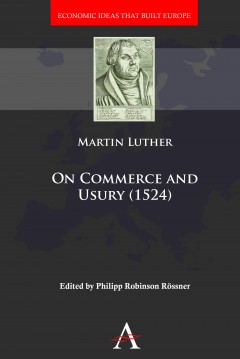On Commerce and Usury (1524)
By Martin Luther
Introduction and notes by Philipp Robinson Rössner
Economic Ideas that Built Europe Anthem Other Canon Economics
Other Formats Available:
- About This Book
- Reviews
- Author Information
- Series
- Table of Contents
- Links
- Podcasts
About This Book
Against the backdrop of today’s renewed uncertainty over the present economic system, this timely volume presents Martin Luther’s contribution to the modern economic sciences, providing a detailed introduction and revised translation of his major pamphlet on economic matters, ‘On Commerce and Usury’ (‘Von Kauffshandlung vnd Wucher’, 1524). In his teachings on indulgences Luther picked up on the question of hoarding money, and was among the earliest voices in early modern Europe calling for an ‘ethical’ economics. Luther’s work prefigured many later contributions to modern economic theory, from the mercantilists and cameralists to the German Historical School.
Luther was, apparently, quite near to what the British economist J. M. Keynes developed as a ‘general theory’ in 1936, relating the power of spendthrift and a pro-active state which made people consume and invest in the economy. And Luther was always very clear about the basic fact that – in order for the economy to work well and society to flourish – markets need rules. Luther’s prescience and enduring relevance are brought to the fore in Philipp Robinson Rössner’s authoritative introduction and notes.
Reviews
‘In his deeply erudite introduction, Philipp Rössner offers a vivid contextualization of Luther’s thinking on how commerce should be managed in order to promote a proper Christian society. Rössner not only explores Luther’s ideas on commerce and ethics from the point of view of modern economics, but he uses Luther’s perspective as a critical lens through which he examines, with great nuance and clarity, the state of economic reasoning today.’ —Carl Wennerlind, Columbia University
‘Luther’s On Commerce and Usury is much more than a sermon. It is a powerful reminder that markets are human constructs and depend on rules for their existence and operation. This inconvenient truth deserves reflection, as Philipp Rössner demonstrates in his fascinating essay. By delving into the context and meaning of a sixteenth-century classic, he speaks to the present.’ —Francesco Boldizzoni, University of Turin
‘In his deeply erudite introduction, Philipp Rössner offers a vivid contextualization of Luther’s thinking on how commerce should be managed in order to promote a proper Christian society. Rössner not only explores Luther’s ideas on commerce and ethics from the point of view of modern economics, but he uses Luther’s perspective as a critical lens through which he examines, with great nuance and clarity, the state of economic reasoning today.’ —Carl Wennerlind, Columbia University
‘Luther’s On Commerce and Usury is much more than a sermon. It is a powerful reminder that markets are human constructs and depend on rules for their existence and operation. This inconvenient truth deserves reflection, as Philipp Rössner demonstrates in his fascinating essay. By delving into the context and meaning of a sixteenth-century classic, he speaks to the present.’ —Francesco Boldizzoni, University of Turin
Author Information
Martin Luther (1483–1546) was a German friar, priest and professor of theology who was a seminal figure in the Protestant Reformation.
Philipp Robinson Rössner is Lecturer (Assistant Professor) in Early Modern History at the University of Manchester.
Series
Economic Ideas that Built Europe
Anthem Other Canon Economics
Table of Contents
Acknowledgements; CRITICAL INTRODUCTION: 1. Approaching Luther; 2. Contextualizing Luther: The Powers of Time and Space; 3. Luther: Impulsive Economics; 4. The Grip of the Dead Hand: Crisis Economics for a Pre-Industrial Society? 5. Von Kauffshandlung und Wucher (1524): Analytical Summary; 6. Conclusion: What Can We Learn from Luther Today?; ON COMMERCE AND USURY (1524): Notes on the Text; On Commerce and Usury; Bibliography; Index
Links
Stay Updated
Information
Latest Tweets



